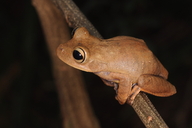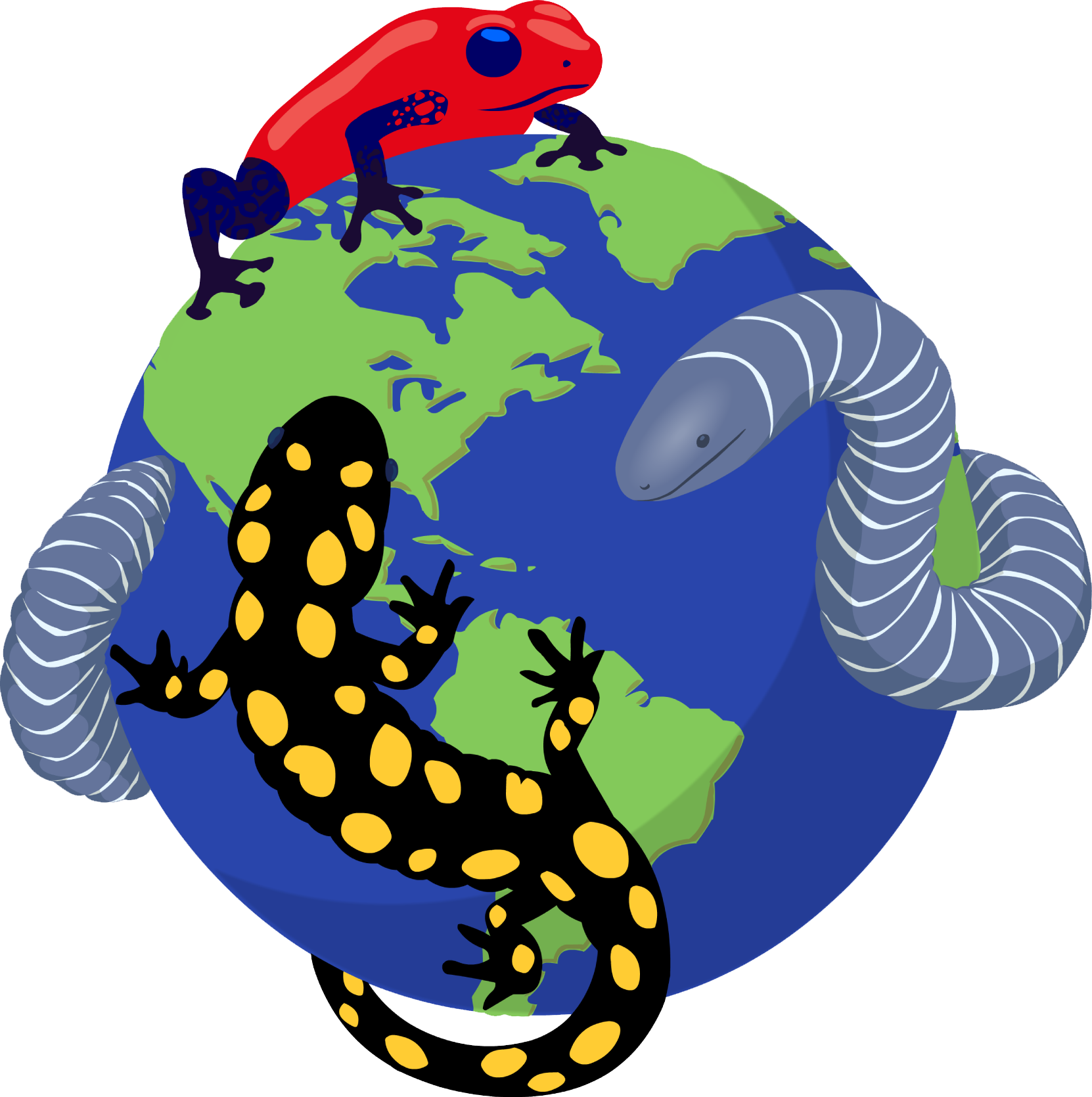|
Description
Bokermannohyla izecksohni is a medium-size hylid frog, reaching a maximum of 51 mm in snout-vent length (Jim and Caramaschi 1979, cited in Caramaschi and Feio 1990). Adults are light brown with a mottled pattern and have yellow coloration on their sides (see photos in Toledo et al. 2008, and Araújo et al. 2009). Distribution and Habitat
Country distribution from AmphibiaWeb's database: Brazil
Four individuals of this species have been collected from three locations in the state of São Paulo, southeastern Brazil. The type locality is at Rubião Júnior, municipality of Botucatu, in a small remnant patch of mesophytic semideciduous Forest at about 900 m a.s.l. (Jim and Caramaschi 1979). The type specimen was collected at a temporary pool (Jim and Caramaschi 1979). In 2005 and 2006 three additional individuals of B. izecksohni were found at two different localities in the state of São Paulo, about 220 km southeast of the type locality (Toledo et al. 2008). An adult female was collected at the Parque Estadual da Serra do Mar (PESM), Núcleo Curucutu, municipality of Itanhaém (at approximately 700 a.s.l.), and an adult male and an adult female were collected in the municipality of Cotia (at about 900 m a.s.l.). These three individuals were found inside forest, perched on tree branches near tiny streams (Toledo et al. 2008). Life History, Abundance, Activity, and Special Behaviors
Bokermannohyla izecksohni appears to breed in temporary ponds (Stuart et al. 2008). Males of this species were considered voiceless as they do not appear to have vocal sacs (Jim and Caramaschi 1979). However, a distress call has been recorded (Toledo and Haddad 2009). Trends and Threats
The type locality has been destroyed by deforestation due to agriculture and human settlement (Stuart et al. 2008). This species is found only in the state of São Paulo, in southeastern Brazil, and has rarely been seen (Stuart et al. 2008). although it may occur more widely in the Atlantic Forest than initially believed and additional surveys are needed (Toledo et al. 2008). The known range does not overlap with any protected areas (Stuart et al. 2008). Possible reasons for amphibian decline General habitat alteration and loss
Habitat modification from deforestation, or logging related activities
Intensified agriculture or grazing
Loss of genetic diversity from small population phenomena
Comments
This species was first described by Jim and Caramaschi (1979), as Hyla izecksohni.
References
Araújo, O. G. dos Santos, Toledo, L. F., Garcia, P. C. A., and Haddad, C. F. B. (2009). ''The amphibians of São Paulo State, Brazil.'' Biota Neotropica, 9, 197-209.
Caramaschi, U., and Feio, R. N. (1990). ''A new species of Hyla (Anura, Hylidae) from southern Minas Gerais, Brazil.'' Copeia, 1990, 542-546.
Jim, J., and Caramaschi, U. (1979). ''Uma nova espécie de Hyla da região de Botucatu, São Paulo, Brasil (Amphibia, Anura).'' Revista Brasileira de Biologia, 39, 717-719.
Stuart, S., Hoffmann, M., Chanson, J., Cox, N., Berridge, R., Ramani, P., Young, B. (eds) (2008). Threatened Amphibians of the World. Lynx Edicions, IUCN, and Conservation International, Barcelona, Spain; Gland, Switzerland; and Arlington, Virginia, USA.
Toledo, L. F., and Haddad, C. F. B. (2009). ''Defensive vocalizations of neotropical anurans.'' South American Journal of Herpetology, 4(1), 25-42.
Toledo, L., Brasileiro, C., Araujo, O., and Haddad, C. (2008). ''Notes of geographic distribution: Amphibia, Anura, Hylidae, Bokermannohyla izecksohni: distribution extension.'' Check List, 4(4), 442-444.
Originally submitted by: Meghan Bishop (first posted 2010-06-24)
Edited by: Kellie Whittaker (2011-04-11)Species Account Citation: AmphibiaWeb 2011 Bokermannohyla izecksohni <https://amphibiaweb.org/species/830> University of California, Berkeley, CA, USA. Accessed May 31, 2025.
Feedback or comments about this page.
Citation: AmphibiaWeb. 2025. <https://amphibiaweb.org> University of California, Berkeley, CA, USA. Accessed 31 May 2025.
AmphibiaWeb's policy on data use.
|




 Map of Life
Map of Life